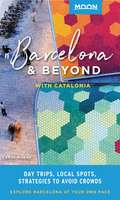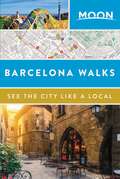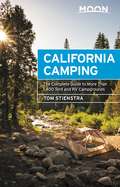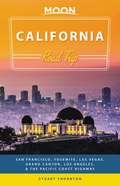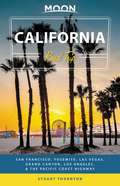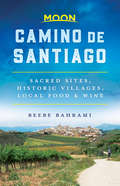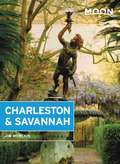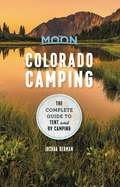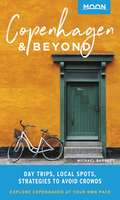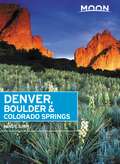- Table View
- List View
Moon Amsterdam Walks (Travel Guide)
by Moon Travel GuidesWander along Amsterdam's sparkling canals, soak up the village vibes and cosmopolitan culture, and experience Amsterdam like a local: on foot!Walk through the city's coolest neighborhoods like the Center, Westerpark, the Jordaan, De Pijp, and more, with color-coded stops and turn-by-turn directionsFind your scene with top ten lists for restaurants, nightlife, museums, and moreGet to know the real Amsterdam: Stroll the canals and admire postmodern architecture or peruse unique boutiques in the buzzing central district. Make like a local and rent a bike, ride along busy boulevards, and break for a picnic at a public park. Sip a tripel or witbier at a traditional brewery or artisanal coffee at an outdoor café. Uncover the city's history in its many museums or check out contemporary art exhibits in industrial-style galleries. Feast on a farm-to-table spread at a trendy restaurant and dance the night away to DJ sets at the city's popular nightclubsEscape the crowds at locally-loved spots and under-the-radar favoritesExplore on the go with foldout maps of each route and a removable full-city map, all in a handy guide that fits in your pocketWith creative routes, public transit options, and a full-city map, you can experience Amsterdam at your own pace without missing a beat.Hit the ground running with more Walks guides, like Moon Barcelona Walks, Moon Berlin Walks, Moon New York City Walks, Moon London Walks, Moon Paris Walks, and Moon Rome Walks.
Moon Anchorage, Denali & the Kenai Peninsula (Travel Guide)
by Don PitcherExcitement awaits on the Last Frontier: make your way through Alaska's mountains, glaciers, and rivers with Moon Anchorage, Denali & the Kenai Peninsula. Inside you'll find:Flexible, strategic itineraries, including five days in Anchorage, a weekend in Denali National Park, day cruises, and a two-week adventure covering the whole regionUnique ideas for outdoor adventurers, wildlife enthusiasts, budget travelers, and moreMust-see highlights and offbeat experiences: Embark on a cruise to admire stunning fjords and watch brown bears catch wild salmon out of a river. Go snowboarding at a mountain resort or hike through alpine forests. Dine on fresh king crab at the best restaurants in Anchorage or catch your own halibut on a fishing expedition. Take an intrepid "flightseeing" tour to secluded glacier landings in Denali National Park and discover the best spots to watch the northern lights dance across the skyWhen to go and where to stay from local author and Alaska expert Don PitcherFull-color, vibrant photos and detailed maps throughoutThorough information including background on the landscape, climate, wildlife, and local cultureHelpful resources like emergency services, transportation and wilderness safety tips, and advice for LGBTQ+ travelers, visitors with children, seniors, and moreWith Moon Anchorage, Denali & the Kenai Peninsula's expert advice and local insight, you can plan your trip your way.Expanding your trip? Check out Moon Alaska.
Moon Asheville & the Great Smoky Mountains (Travel Guide)
by Jason FryeWhether you're hopping between microbreweries or hiking the Appalachian Trail, get to know this charming Southern hub with Moon Asheville & the Great Smoky Mountains. Inside you'll find:Flexible, strategic itineraries, from a weekend in Asheville to five days in Great Smoky Mountains National Park, designed for outdoor adventurers, foodies, history buffs, and moreThe best local flavor: Indulge in award-winning cuisine on a food tour, discover the microbreweries that earned Asheville the title of "Beer City USA," and catch a live show from a local band. Admire the art deco architecture downtown, gallery-hop in repurposed warehouses, or check out an indie bookstoreUnique outdoor experiences: Hike through the mountains and meadows along the Appalachian Trail, take a dip in the hot springs dotting the hillsides, or break out the binoculars for some top-notch wildlife-watching. Set up camp in the Pisgah National Forest, peep the changing leaves in autumn, or go rafting, kayaking, or canoeing on the French Broad RiverHonest advice on when to go, where to stay, and how to get around from North Carolina local Jason FryeFull-color photos and detailed maps throughoutThorough background on the culture and history, wildlife, and geographyHelpful tips for hikers and campers, LGBTQ+ travelers, and travelers with disabilitiesFind your adventure with Moon Asheville & the Great Smoky Mountains.Exploring more of the South? Try Moon Carolinas & Georgia. Looking for more Southern city charm? Try Moon Charleston & Savannah.
Moon Atlantic Canada: Nova Scotia, New Brunswick, Prince Edward Island, Newfoundland & Labrador (Travel Guide)
by Andrew HempsteadFrom rugged coastline and uninhabited islands, to charming seaside towns full of friendly locals, experience the best of this adventurous region with Moon Atlantic Canada. Inside you'll find:Strategic, flexible itineraries including scenic drives, aquatic adventures, and the two-week best of Atlantic Canada, designed for outdoor enthusiasts, families, history buffs, and moreUnique experiences and outdoor experiences: Kayak to a remote island for a picnic lunch, or sample local oysters at a waterfront restaurant. Drive the Cabot Trail or the Irish Loop and take in the stunning scenery, or bike through UNESCO protected towns. Relax at quaint colonial inns, or camp out under the stars. See if you can spot one of the world's rarest whales, or indulge your literary side by visiting sights from Anne of Green GablesExpert advice from local Andrew Hempstead on when to go, where to stay, and how to get aroundFull-color photos and detailed maps throughoutIn-depth coverage of Nova Scotia, New Brunswick, Prince Edward Island, Newfoundland, and LabradorBackground information on the landscape, culture, history, and environmentWith Moon's practical tips and local insight on the best things to do and see, you can experience the best of Atlantic Canada.Sticking to one province? Check out Moon Nova Scotia, New Brunswick & Prince Edward Island.
Moon Bahamas (Travel Guide)
by Mariah Laine MoyleTurquoise waters, pristine beaches, world-famous rum, and a culture that welcomes you with a smile: Soak up the sun and fun with Moon Bahamas. Inside you'll find:Flexible itineraries, from a Nassau getaway to a week of island-hopping, including day trips to the Out Islands Strategic advice for travelers looking for family fun, romance, nightlife, water sports, and moreMust-see highlights and unique experiences: Go diving to see shipwrecks, underwater sculptures, and coral reefs, snorkel with sharks, or swim with friendly pigs. Spot wild pink flamingoes, climb to a historic stone monastery at the highest point in the Bahamas, or visit the iconic Hope Town Lighthouse. Relax in an oceanfront bungalow, sip cocktails made from local rum, and hang out with locals at a fish fryHonest recommendations from Nassau local Mariah Moyle on when to go, where to eat, how to get around, and where to stay, from guest cottages and beach bungalows to luxurious resortsFull-color photos and detailed maps throughout Background information on the landscape, climate, wildlife, and history Handy tips for families with children, LGBTQ travelers, seniors, and travelers with disabilitiesExperience the real Bahamas with Moon's practical tips and local know-how.Looking for more island adventures? Check out Moon Aruba, Moon Bermuda, or Moon Jamaica.
Moon Baja: Tijuana to Los Cabos (Travel Guide)
by Jennifer KramerWild ocean, rugged desert mountains, and a wealth of culinary delights: Immerse yourself in this colorful peninsula with Moon Baja. Inside you'll find:Strategic itineraries for road-trippers, foodies, ocean adventurers, and more, whether you're spending a few days or a few weeks in BajaThe top activities and unique experiences: Cruise down Mexico's Highway 1 with endless desert as a backdrop and the warm Baja breeze on your face. Sip cerveza from your hammock or take a Panga ride to see dolphins, whales, and sharks in the Sea of Cortez. Shop for beautiful artisan goods in Loreto and make a bonfire on the beach as the sun sets over the oceanThe best local flavors: Go wine tasting in Ensenada, sample the freshest fish tacos on the beaches of Los Cabos, and check out the trendy street food and craft beer scenes in TijuanaRoad trips including Tijuana to Tecate, the Cabo Loop, a classic Baja road trip, and four-day getaways explore the best of Tijuana, Ensenada, Valle de Guadalupe, Los Cabos, Todo Santos, and moreHonest advice from local tour guide Jennifer KramerFull-color photos and detailed maps throughoutHelpful background on the landscape, culture, history, and environment, plus tips for health and safety, how to get around, and a handy Spanish phrasebookExperience the best of Baja with Moon.Hoping for más Mexico? Check out Moon Yucatán Peninsula, Moon San Miguel de Allende, or Moon Mexico City.
Moon Barcelona & Beyond: Day Trips, Local Spots, Strategies to Avoid Crowds (Travel Guide)
by Carol MoranWhether you're marveling at Gaudi masterpieces or cheering with locals at a fútbol match, soak up the best of Catalonia's sun, sea, and delicious flavors with Moon Barcelona & Beyond.Explore In and Around the City: Get to know Barcelona's most interesting neighborhoods, like the Gothic Quarter, El Born, the Ciutat Vella, and Gràcia, and nearby regions, including Girona, Sitges, and moreGo at Your Own Pace: Choose from tons of itinerary options designed for foodies, beach-goers, history buffs, art lovers, and moreSee the Sights: Marvel at the Sagrada Familia's fantastical architecture, hike through the colorful Parc Güell, see Picasso's earliest-known drawings, and stroll the narrow streets of the Barri Gòtic Get Outside the City: Savor cava in the Penedès wine region, swim in the sparkling water on the Costa Brava, explore the medieval village of Besalú, or climb to the Sant Jeroni peak in MontserratSavor the Flavors: Feast on a seafood paella, sample your way through a bustling market, and find the best spots for authentic tapasExperience the Nightlife: Sip sangria on the beach, discover a local favorite cocktail bar, people-watch from a bustling terrace, and enjoy regional Catalan winesGet to Know the Real Barcelona: Follow suggestions from Barcelona transplant Carol Moran for supporting indie businesses and avoiding crowdsFull-Color Photos and Detailed MapsHandy Tools: Background information on Catalan and Basque history and culture, plus tips on ethical travel, what to pack, where to stay, and how to get aroundDay trip itineraries, favorite local spots, and strategies to skip the crowds: Take your time with Moon Barcelona & Beyond.Exploring more of Europe? Check out Moon Venice & Beyond or Moon Lisbon & Beyond.
Moon Barcelona & Madrid (Travel Guide)
by Jessica JonesWhether you're rambling down Las Ramblas or making your way down the Gran Via, take your time getting to know Spain's top cities with Moon Barcelona & Madrid. Inside you'll find:Flexible itineraries for up to a week in Barcelona or Madrid that can be combined into a 2-week trip, including day trips to Montserrat, the Penedès wine region, Toledo, and moreStrategic advice for foodies, art lovers, history buffs, and moreMust-see highlights and unique experiences: Marvel at Gaudi's architectural masterpiece Sagrada Familia, stroll through the baroque Royal Palace, or contemplate Picasso's Guernica and Velázquez's Las Meninas. Cheer for the home team at a fútbol match, people-watch from a sunny café terrace, or climb to the top of Mount Tibidabo and explore the lush surrounding parkSavor the flavors of Barcelona and Madrid: Sample mouthwatering jamon or zumo at a sprawling market or snag a table at a Michelin-starred restaurant. Post up with the locals at a no-frills tapas joint, sip authentic vermouth, or snack on the catch of the day at a beach-front barHonest suggestions from Madrid local Jessica JonesFull-color photos and detailed maps throughout Background information on the landscape, history, and cultural customs of each cityHandy tools such as visa information, Spanish and Catalan phrasebooks, and local insight for solo travelers, visitors with disabilities, seniors, LGBTQ travelers, travelers of color, and families with childrenWith Moon's practical tips and local insight, you can enjoy Barcelona and Madrid at your own pace.For more of Europe's best cities, try Moon Rome, Florence & Venice.
Moon Barcelona Walks (Travel Guide)
by Moon Travel GuidesExperience Barcelona like a local: on foot! Wander "Barça's" ancient alleys and beachfront boulevards, savor the sunshine and sangria, and discover the city's hip hot spots and bohemian hangouts with Moon Barcelona Walks. This full-color guide features:Six customizable walks through the city's liveliest neighborhoods, including El Born, Gràcia, Barceloneta, the Gothic Quarter, and more, with color-coded stops and turn-by-turn directions; Foldout maps of each route and a removable full-city map in a handy, portable guide; Curated "Top Ten" lists for architecture, restaurants, Sunday activities, and nightlife, for visitors looking to hit the highlights; The top attractions and the best-kept local secrets: Browse designer boutiques and pop in to a trendy coffee shop, or stroll the beaches of Barceloneta to bask in the culture of an authentic fishing neighborhood. Marvel at the Sagrada Familia, or admire gothic architecture as you stroll the medieval streets of the historic barri. Walk through an old Olympic village, wander through Park Güell, and see the famed works of Picasso and Gaudi. Sip sangria by the beach, sample classic and modern tapas, and discover the hippest bars and clubs for a night on the town; Public transportation options, including the metro, bus, or bike rental; Tips for first-time visitors, including national holidays, where you'll need to make a reservation, and getting to and from the airport; With creative routes, public transit options, and a full-city map, you can explore Barcelona at your own pace, without missing a beat.
Moon Berlin Walks (Travel Guide)
by Moon Travel GuidesExperience Berlin like a local: on foot!Moon Berlin Walks reveals Berlin's thriving art scene, palpable history, and unique vibe by guiding you to the city's unmissable hotspots and trendiest locales. This full-color guide features:Six customizable walks through the city's hippest neighborhoods, including Kreuzberg, Prenzlauer Berg, Shöneberg, and more, with color-coded stops and turn-by-turn directionsFoldout maps of each route and a removable full-city map, in a handy, portable guideCurated "Top Ten" lists for restaurants, street food, nightlife, and Sunday activities for visitors looking to hit the highlightsThe top attractions and the best-kept local secrets: Stumble upon the newest, hippest coffee shop in Prenzlauer, or kick back in a popular public park. Discover your favorite currywurst or kebap stand, or sample schnitzel, spätzle, and brews at a biergarten. Peruse vintage knick-knacks at a Sunday flea market, and admire the works of art along the East Side Gallery. Browse world-class museums, or head to historical sites like Checkpoint Charlie. Dance the night away to an up-and-coming DJ set in an open-air club or underground warehouse party, or sip craft cocktails at a brand-new rooftop bar overlooking the cityPublic transportation options, including the subway, bus, taxi, or bike rentalTips for first-time visitors, including navigating nightlife, where you'll need to make a reservation, and getting to and from the airportWith creative routes, public transit options, and a full-city map, you can explore Berlin at your own pace, without missing a beat.Check out our guides to more of the world's liveliest cities, so you can hit the ground running! Also available: Moon Barcelona Walks, Moon New York Walks, Moon London Walks, Moon Amsterdam Walks, Moon Paris Walks, and Moon Rome Walks
Moon California Camping: The Complete Guide to More Than 1,400 Tent and RV Campgrounds (Moon Outdoors)
by Tom Stienstra20 million acres of forest, 1,200 miles of coastline, and countless wilderness areas: find your perfect campsite with Moon California Camping.A Campsite for Everyone: A variety of campgrounds and RV parks, from secluded Sierra hike-ins to convenient roadside stopovers, including dog-friendly, family-friendly, and wheelchair accessible optionsRatings and Essentials: All campsites are rated on a scenic scale and marked with amenities like restrooms, trailhead access, picnic areas, laundry, piped water, showers, and playgroundsRecreation Highlights: Discover nearby hiking, swimming, fishing, water-skiing, whitewater rafting, hot springs, and options for winter sportsMaps and Directions: Easy-to-use maps and detailed driving directions for each campgroundSkip the Crowds: Moon California Camping contains many secluded spots and campgrounds that aren't available in the state's online reservation systemThe Top RV and Tent Sites for You: Pick the right campsite for your travel style with lists like "Best for Families," "Scenic Campgrounds," and "Best Island Retreats"Trailhead Access Campgrounds: Find sites that offer access to the John Muir Trail, the Pacific Crest Trail, and more, plus essential information on hikingTrusted Advice: Expert outdoorsman Tom Stienstra knows his stuff; he's hiked 25,000 miles in and around these campgrounds for over 30 yearsTips and Tools: Information on equipment, food and cooking, first aid, and insect protection, plus background on the climate, landscape, and history of the campgroundsWhether you're a veteran or a first-time camper, Moon's comprehensive coverage and trusted advice will have you gearing up for your next adventure.Narrowing your search? Try Moon Northern California Camping. Hitting the road? Check out Moon California Road Trip.Full coverage of: The Redwood Empire, Shasta and Trinity, Lassen and Modoc, Mendocino and Wine Country, Sacramento and Gold Country, Tahoe and the Northern Sierra, the San Francisco Bay Area, Monterey and Big Sur, the San Joaquin Valley, Yosemite and Mammoth Lakes, Sequoia and Kings Canyon, Santa Barbara, Los Angeles and San Diego (and their surrounding areas), and the California deserts, including Death Valley and Palm Desert
Moon California Road Trip: San Francisco, Yosemite, Las Vegas, Grand Canyon, Los Angeles & the Pacific Coast (Travel Guide)
by Stuart ThorntonHit the Road with Moon Travel Guides!From the waterfalls of Yosemite and the colorful Grand Canyon to the Hollywood Walk of Fame and the Golden Gate Bridge, cruise through the best of the West with Moon California Road Trip. Inside you'll find:Maps and Driving Tools: Over 40 easy-to-use maps keep you oriented on and off the highway, along with site-to-site mileage, driving times, and detailed directions for the entire routeEat, Sleep, Stop and Explore: With lists of the best hikes, views, restaurants, and more, you can ride a cable car in San Francisco or hike Half Dome, descend deep into the Grand Canyon, or hit the waves in a classic SoCal surf town. Wander through history at Alcatraz, snap a photo at Big Sur, or marvel at jellyfish at the Monterey Bay Aquarium. Chow down on an authentic Mission burrito, lunch on fish tacos by the beach, or watch the sunset from a rooftop bar in Los AngelesFlexible Itineraries: Drive the entire two-week "Best of the West," mix and match destinations for shorter road trips, or follow strategic itineraries for spending time in San Francisco, Yosemite, Las Vegas, the Grand Canyon, Los Angeles, and smaller towns along the Pacific Coast HighwayLocal Insight: Surfer and adventurer Stuart Thornton shares his thirst for the next secluded beach, quirky pit stop, and mountaintop vista Planning Your Trip: Know when and where to get gas, how to avoid traffic, tips for driving in different road and weather conditions, and suggestions for international visitors, LGBTQ+ travelers, seniors, and road trippers with kidsWith Moon California Road Trip's practical tips, detailed itineraries, and local expertise, you're ready to fill up the tank and hit the road.Doing more than driving through? Check out Moon California, Moon Grand Canyon, or Moon Yosemite, Sequoia & Kings Canyon.
Moon California Road Trip: San Francisco, Yosemite, Las Vegas, Grand Canyon, Los Angeles & the Pacific Coast (Travel Guide)
by Stuart ThorntonColorful cable cars, sunny beaches, seaside havens, and thundering waterfalls: Buckle up for the best of the Golden State with Moon California Road Trip. Inside you'll find:Flexible Itineraries: Drive the entire "Best of the West" loop, mix and match destinations for shorter road trips, or follow strategic itineraries for spending time in San Francisco, Yosemite, Las Vegas, the Grand Canyon, Los Angeles, and smaller towns along the Pacific Coast HighwayEat, Sleep, Stop and Explore: Experience California and the Southwest your way with lists of the best hikes, views, restaurants, and more. Conquer Half Dome, stroll across the Golden Gate Bridge, venture into the depths of the Grand Canyon, or snap a picture on the Hollywood Walk of Fame. Step back in time at Alcatraz, tour the opulent rooms of Hearst Castle, or marvel at the jellyfish at the Monterey Bay Aquarium. Satisfy your cravings with an authentic Mission burrito, be dazzled by an over-the-top Las Vegas show, or enjoy a technicolor sunset from a rooftop bar in Los AngelesMaps and Driving Tools: Over 40 easy-to-use maps keep you oriented on and off the highway, along with site-to-site mileage, driving times, and detailed directions for the entire routeLocal Insight: Surfer and adventurer Stuart Thornton shares his passion for the state's best secluded beaches, quirky pit stops, and mountaintop vistasPlanning Your Trip: Know when and where to get gas, how to avoid traffic, tips for driving in different road and weather conditions, and suggestions for international visitors, LGBTQ+ travelers, seniors, and road trippers with kidsHelpful resources on Covid-19 and traveling in CaliforniaWith Moon California Road Trip's practical tips, detailed itineraries, and local expertise, you're ready to fill up the tank and hit the road. Doing more than driving through? Check out Moon Los Angeles, Moon Grand Canyon or Moon Yosemite, Sequoia & Kings Canyon.
Moon Camino de Santiago: Sacred Sites, Historic Villages, Local Food & Wine (Travel Guide)
by Beebe BahramiOver 1,200 years old, 500 miles long, and rich with tradition and sacred history: Embark on the trip of a lifetime with Moon Camino de Santiago. Inside you'll find:Strategic trekking guides for walking the Camino, including where to start to get the Compostela certificate and excursions to gateway cities like Santiago, Léon, and PamplonaUnique ideas for enriching your experience: Admire folkloric art and Romanesque churches, stroll through the stone archways and winding alleys of medieval cities, and soak up mountain views as you cross over the Pyrenees and descend into green valleys. See the archaeological site where Europe's oldest humans were uncovered and breathe in the salty ocean air as you finish your journey at the shores of the AtlanticSavor the local flavors: Enjoy authentic jamón serrano, tapas, and Galician wine, or grab fresh cheese and bread for a picnic lunchThe best detours, festivals, and villages along the way: Linger in Estella, witness the running of the bulls in Pamplona, visit the monastery in Nájera, or sip wine in CacabelosEssential planning information on when to go, how to get there, where to eat, and where to stay, from pilgrim dorms to private hotels, plus tips on hazards, precautions, and gearValuable insight on the history and context of the pilgrimage from expert Beebe Bahrami, who has walked the Camino many times since 1995Full-color photos and detailed maps throughout, plus a handy fold-out map of the entire routeThorough background information on the sacred sites and history of the Camino, as well as the landscape, culture, and local etiquetteHandy tools including Spanish and French phrasebooks, visa information, volunteer opportunities, and tips for seniors, women traveling alone, religious and secular travelers, and LGBTQ travelersStart your transformative journey with the expert insight, unique suggestions, and practical advice of Moon Camino de Santiago.
Moon Cape Cod, Martha's Vineyard & Nantucket: Martha's Vineyard And Nantucket (Travel Guide)
by Ray BartlettFrom fine-art galleries to fried clams, celebrity sightings to surfcasting, escape to the Cape with Moon Cape Cod, Martha's Vineyard & Nantucket. Inside you'll find:Flexible, strategic itineraries, including weekend getaways to Cape Cod, Martha's Vineyard, or Nantucket, and the 12-day best of all three, designed for outdoor adventurers, beach bums, foodies, families, winter visitors, and moreMust-see highlights and unique experiences: Relax on miles of sandy beaches, admire 19th century lighthouses, take in some local lore at the Whaling Museum, or visit a wildlife sanctuary. Feast on raw oysters, fried clams, and fresh fish, kick back at an old-school drive-in theater, or play maritime-themed miniature golf. Stroll the cobblestone streets of Nantucket or pop into the galleries and artisan studios on the CapeThe top outdoor activities: Kayak through misty marshes, spot dolphins from a sailboat, hike to cliffside bluffs, or bike the serene beach paths of Martha's VineyardHonest advice on when to go, how to get around, and where to stay, from quiet seaside cottages to historic guest houses and posh resortsValuable insight from Cape Cod local Ray BartlettFull-color photos and detailed maps throughoutThorough information including background on the landscape, climate, wildlife, and cultureWith Moon Cape Cod, Martha's Vineyard & Nantucket's practical tips and local insight on the best things to do and see, you can plan your trip your way.Exploring more of New England? Try Moon Maine, Vermont & New Hampshire. Hitting the road? Check out Moon New England Road Trip.
Moon Charleston & Savannah (Travel Guide)
by Jim MorekisWhether you're relaxing on a romantic beach, soaking up the rich history, or reveling in the Southern hospitality, dig into these fun-loving sister cities with Moon Charleston & Savannah.Explore the Cities: Navigate by neighborhood or by activity with color-coded maps of both Charleston and SavannahSee the Sights: Browse the museums on Savannah's historic River Street, take a carriage ride through Charleston's French Quarter, or check out the wares at the Old City Market. Visit Civil War battlefields, check out the First African Baptist Church, and learn about the area's important African American historyGet a Taste of the South: Sample classic shrimp and grits, juicy barbecue, or seafood straight off the boat. Savor innovative cuisine at James Beard Award-winning restaurants, and discover up-and-coming spots focusing on local, sustainable ingredientsBars, Entertainment, and Nightlife: Watch the sunset from a rooftop bar, see what's on tap at a craft brewery, or mingle with the locals at a French Quarter dive. Catch a live gig from the next big indie band, sip swanky artisan cocktails, or indulge in Savannah's to-go cup tradition on a stroll through the Historic DistrictHonest Advice: Jim Morekis was born and raised in Savannah and shares his local insight into these beautiful citiesItineraries and Day Trips: Follow itineraries designed for families, beach lovers, history buffs, foodies, and more, and get outside the city with full chapters on Hilton Head and the Lowcountry and the Golden IslesFull-Color Photos and Detailed MapsHandy Tools: Background information on the area's landscape, history, and culture, tips on getting there and getting around, and advice for travelers with disabilities, families with children, seniors, and LGBTQ+ travelersWith Moon's practical tips and local know-how, you can experience Charleston and Savannah your way.Hitting the road? Try Moon Blue Ridge Parkway Road Trip. Exploring more of the South? Try Moon Coastal Carolinas or Moon Asheville & the Great Smoky Mountains.Special ebook features:Easily navigate listings with quick searches, plus website links and zoom-in maps and imagesPersonalize your guide by adding notes and bookmarks
Moon Charleston: With Hilton Head & the Lowcountry (Travel Guide)
by Jim MorekisGet to know Charleston's fun-loving lifestyle, soak up its gothic architecture, and revel in its classic Southern charm with Moon Charleston.Explore the City: Navigate by neighborhood or by activity, with color-coded maps of Charleston's most interesting areasSee the Sights: Take a guided tour of Fort Sumter or visit the house where Harriet Tubman worked as a nurse. Admire antebellum architecture on the oldest street in the city or stroll along the harbor's Waterfront Park. Check out the evocative old churches and gothic cemeteries in the French Quarter, or do a little shopping along bustling King StreetGet a Taste of the City: Sample freshly-caught seafood, home-style Southern cooking, and the smokiest slabs of barbecue aroundBars and Nightlife: Kick back with locals at a dive bar, sip cocktails at a five-star restaurant, or explore the hip Upper King neighborhoodHonest Advice: Charleston expert Jim Morekis shares his insider tipsItineraries and Day Trips: Follow itineraries designed for families, beach lovers, history buffs, foodies, and more, and get outside the city to Hilton Head and the LowcountryFull-Color Photos and Detailed MapsHandy Tools: Background information on Charleston's landscape, history, and culture, tips on getting there and getting around, and advice for travelers with disabilities, families with children, seniors, and LGBTQ+ travelersWith Moon Charleston's local know-how and practical advice, you can plan your trip your way.Hitting the road? Try Moon Blue Ridge Parkway Road Trip. Seeing more southern cities? Try Moon Atlanta or Moon Savannah.
Moon Cleveland (Travel Guide)
by Douglas TrattnerExperience a city with Rust Belt roots and a vibrant, creative spirit with Moon Cleveland. Inside you'll find: Explore the City: Navigate by neighborhood or by activity, with color-coded maps of Cleveland's most interesting neighborhoodsSee the Sights: Root for the Cleveland Indians at "The Jake," check out the legendary costumes, instruments, and handwritten lyrics at the Rock & Roll Hall of Fame, admire industrial-era mansions, or check out the Museum of Contemporary ArtGet a Taste of the City: Dine at a trattoria in Little Italy, savor fresh fare at farm-to-table restaurants, sample falafel, pierogis, local cheeses and more at the Westside Market, and relax with a pint at a craft breweryBars and Nightlife: Catch a performance at the House of Blues, play bocce ball in an Irish pub, polka-dance at a popular local happy hour, or sip craft cocktails in a historic loungeLocal Advice: Douglas Trattner shares insider know-how on the city he calls homeItineraries and Day Trips: Explore nearby Lake Erie, Akron, and Amish Country, or follow city itineraries designed for long weekends, rainy days, and moreHandy tools like full-color photos, detailed maps, and background information on the history and culture of ClevelandWith Moon Cleveland's practical tips and local insight, you can experience the city your way.Exploring more Midwest cities? Check out Moon Chicago or Moon Minneapolis & St. Paul.
Moon Coastal Maine: With Acadia National Park (Travel Guide)
by Hilary NangleExperience the best of Maine's spruce-studded islands, classic shoreline villages, and rugged character with Moon Coastal Maine. Inside you'll find:Strategic, flexible itineraries like a long weekend Down East, five days in Acadia, and a two-week road trip, designed for history buffs, foodies, beach-goers, outdoor adventurers, and moreMust-see highlights and unique experiences: Bike through timberland forests or take a lighthouse cruise down the Kennebec River. Sample wild blueberries, farmstead cheeses, and preserves from roadside farm stands, find the best beachfront lobster shack, or mingle with locals over a "chowdah suppah." Discover maritime history in a traditional fishing village or explore pedestrian-only islands packed with hiking trails. Watch the boats sway in a quiet harbor, unwind on a sandy pocket beach sandwiched between two headlands, or immerse yourself in the secluded wilderness of Mount Desert Island and Acadia National ParkHonest insight from Maine native Hilary Nangle on when to go, where to eat, and where to stay, from budget campgrounds to historic inns Full-color photos and detailed maps throughoutRecommendations for getting there and getting around by plane, car, train, or busThorough background on the culture, environment, wildlife, and historyWith Moon's practical tips and local know-how, you can experience the best of coastal Maine.Exploring inland? Try Moon Maine. Hitting the road? Check out Moon New England Road Trip.
Moon Colorado Camping: The Complete Guide to Tent and RV Camping (Moon Outdoors)
by Joshua BermanFind your perfect campsite in the Centennial State with Moon Colorado Camping.A Campsite for Everyone: Choose from a variety of campgrounds and RV parks, from secluded hike-ins to convenient roadside stopovers, including dog-friendly, family-friendly, and wheelchair accessible optionsRatings and Essentials: All campsites are rated on a scenic scale and marked with amenities like restrooms, trailhead access, picnic areas, laundry, piped water, showers, and playgroundsRecreation Highlights: Discover nearby hiking, swimming, fishing, whitewater rafting, hot springs, and options for winter sportsMaps and Directions: Easy-to-use maps and detailed driving directions for each campgroundSkip the Crowds:Moon Colorado Camping contains many secluded spots and campgrounds that aren't available in the state's online reservation systemThe Top RV and Tent Sites for You: Pick the right campsite for your travel style with lists of best campgrounds for stunning views, hot springs, weddings, and moreTrailhead Access Campgrounds: Find sites that offer access to the trails throughout the Western Slope, Rocky Mountains, Four Corners and the San Juan Mountains, the San Luis Valley, and moreExpert Advice: Local lifelong camper Joshua Berman offers his perspective and insider know-howTips and Tools: Information on equipment, food and cooking, first aid, and insect protection, plus background on the climate, landscape, and history of the campgroundsWhether you're a veteran or a first-time camper, Moon's comprehensive coverage and trusted advice will have you gearing up for your next adventure.Want to explore the city? Try Moon Denver, Boulder, and Colorado Springs.
Moon Copenhagen & Beyond: Day Trips, Local Spots, Strategies to Avoid Crowds (Travel Guide)
by Michael BarrettWhether you're sipping coffee by a canal, exploring lavish palaces, or discovering the real meaning of hygge, get to know the Danish capital with Moon Copenhagen & Beyond.Explore In and Around the City: Meander through Copenhagen's most interesting neighborhoods, like the Inner City, Vesterbro, Nørrebro, and Christianshavn, and nearby areas, including Kronborg, Kongens Lyngby, Malmö, and moreGo at Your Own Pace: Choose from tons of itinerary options designed for foodies, history buffs, art lovers, and moreSee the Sights: Stroll cobbled streets and bike along picture-perfect canals, watch the changing of the guard at Amalienborg, picnic on the grounds of the Frederiksberg Palace, and spend an afternoon at the iconic old-school amusement park Tivoli GardensGet Outside the City: Visit the renowned art collection on the shores of the Øresund, unwind in the Swedish coastal city of Malmö, or stroll the old-fashioned fairground in Kongens LyngbySavor the Flavors: Snack on open-faced rugbrød (rye bread) sandwiches or delicious Danish pastries, sample Middle Eastern mezze or shawarma, or dine at Michelin-starred restaurantsExperience the Nightlife: From wine bars and craft cocktail lounges to thrifty bodegas and pop-up "Friday bars," dig into Copenhagen's vibrant nightlifeGet to Know the Real Copenhagen: Denmark local Michael Barrett shares his favorite spots in the cityFull-Color Photos and Detailed Maps throughout, plus a fold-out mapHandy Tools: Background information on the city's history and culture, plus tips on sustainable travel, what to pack, where to stay, and how to get aroundDay trip itineraries, favorite local spots, and strategies to skip the crowds: Take your time with Moon Copenhagen & Beyond.Want to experience more of Scandinavia? Try Moon Norway. Exploring more of Europe? Check out Moon Rome, Florence & Venice or Moon Barcelona & Madrid.
Moon Costa Rica (Travel Guide)
by Nikki SolanoWhether you're zip-lining through cloud forests, relaxing on a wellness retreat, or swimming with manta rays, discover the real pura vida with Moon Costa Rica. Inside you'll find:Flexible, strategic itineraries designed for backpackers, beach-lovers, adventure travelers, honeymooners, and more, including the best beaches for swimming, sunsets, and seclusionThe best spots for eco-friendly outdoor adventures like kayaking, hiking, and scuba-diving: Swim under a waterfall, raft over rapids, explore mysterious caves, and cliff-dive into river pools. Hike to the summit of Mount Chirripó, the highest point in Costa Rica, snorkel with sea turtles in warm turquoise water, or soak in a volcanic mineral poolUnique and authentic experiences: Admire the forest floor from the middle of a hanging bridge, or take an aerial tram to lake, volcano, and ocean views. Relax on a pristine beach and watch the sunrise with a cup of flavorful local coffee. Fill up on fried plantains at a traditional soda, and shop at a neighborhood mercado Insight from Cartago local Nikki Solano on how to experience Costa Rica like an insider, support local and sustainable businesses, avoid crowds, and respectfully engage with the cultureFull-color photos and detailed maps throughoutBackground information on Costa Rica's landscape, history, and cultural customs, as well as volunteer opportunities Handy tools including a Spanish phrasebook, packing suggestions, and travel tips for disability access, solo travelers, seniors, and LGBTQ travelersWith Moon's practical tips and local know-how, you can experience Costa Rica your way.Exploring more of Central America? Check out Moon Belize.
Moon Croatia & Slovenia (Travel Guide)
by Shann Fountain AlipourSun-drenched villages and warm beaches, thick forests and snow-capped mountains: Immerse yourself in a postcard come to life with Moon Croatia & Slovenia. Inside you'll find: Flexible itineraries from one week in each country to two weeks in both, including a side trip to Montenegro, plus how to make the most of short stays in Zagreb, Dubrovnik, and LjubljanaStrategic advice for history buffs, outdoor adventurers, foodies, island-hoppers, families with kids and more Suggestions for a Dalmatian Islands getaway and other day trips to escape the city crowds Must-see highlights and unique experiences: Go truffle hunting in Istria or taste homemade vintages on an ancient wine route. Walk along the creamy stone and red-tiled roofs inside Dubrovnik's 15th-century walls or wander through Ljubljana's historic Tivoli Park. Leave crowded beaches behind and hire a boat to explore lesser-known islands. Wind your way up snowy Mount Sljeme, hike to caves and waterfalls in Croatia's Plitvice Lakes National Park or go rafting in Slovenia's Soca RiverExpert insight on when to go, what to do, and where to stay from former Zagreb local Shann Fountain AlipourFull-color photos and detailed maps throughoutBackground information on the landscape, history, and cultural customs of each countryHandy tools such as visa information, Croatian, Slovenian, and Montenegrin phrasebooks, and insider tips for traveling with children, as a senior, and moreExperience Croatia & Slovenia your way with Moon's practical tips and local insight.Looking for more sunshine? Try Moon Amalfi Coast or Moon Milan & the Italian Lakes. Heading East? Check out Moon Prague, Vienna & Budapest.
Moon Death Valley National Park (Travel Guide)
by Jenna BloughTrek across the salt flats, scale the towering rocks, and explore the marble canyons of this otherworldly landscape with Moon Death Valley National Park. Inside you'll find:Flexible, strategic itineraries, ranging from one day in the park to a week-long trip, designed for day-hikers, road-trippers, outdoor adventurers, history buffs, and moreThe top experiences and unique ideas for exploring Death Valley: Hike through forested trails to sweeping canyon views, and discover abandoned mining camps, remote ghost towns, and hidden springs. Go four-wheeling in rugged backcountry, or cruise along Badwater Basin Road to check out iconic sights like the Devil's Golf Course, Artist's Drive, and Zabriskie Point. Admire surreal salt flats, ethereal rock formations, colorful mosaic stone, and sculpted sand dunes, and find the best vistas for that perfect sunset photo-opPractical tips for hiking, four-wheel driving, camping, and other recreation, plus information on the right gear to pack for the desert Detailed hike descriptions with mileage, elevation gains, difficulty ratings, and trailhead directionsHonest advice from Death Valley expert Jenna Blough on when to go and where to stay, whether you're pitching the tent, parking the RV, or bedding down at a hotel Up-to-date information on park fees, passes, and reservations, plus strategies for getting to Death Valley National ParkFull-color photos and detailed maps throughoutCoverage of gateway towns and excursions beyond the park, including the John Muir Wilderness, the Ash Meadows National Wildlife Refuge, and the Trona PinnaclesRecommendations for families, seniors, international visitors, and travelers with disabilitiesThorough background on Death Valley's wildlife, terrain, culture, and historyWith Moon's practical tips and expert know-how, you can experience Death Valley your way.Exploring more of the West? Try Moon California Road Trip, Moon Palm Springs & Joshua Tree or Moon Nevada.For full coverage of America's national parks, check out Moon USA National Parks: The Complete Guide to All 59 National Parks.Special ebook features:Easily navigate listings with quick searches, plus website links and zoom-in maps and imagesPersonalize your guide by adding notes and bookmarks
Moon Denver, Boulder & Colorado Springs (Travel Guide)
by Mindy SinkWorld-class breweries, rugged mountain peaks, and a funky college town: dive into the diversity of the Front Range with Moon Denver, Boulder & Colorado Springs. Inside you'll find:Flexible itineraries, from a week exploring Denver, Boulder, and Colorado Springs to day trips to nearby ski resorts and Rocky Mountain National ParkStrategic advice for outdoor adventurers, culture and history buffs, foodies, and moreMust-see highlights and unique experiences: Check out a new exhibit at the Denver Art Museum, catch a performance under the open sky at Red Rocks Amphitheatre, or explore the Wild West at the Museum of the American Cowboy. Ski the fresh powder at Loveland or Winter Park and relax with an après-ski drink. Go rafting on the Cache La Poudre river, rock-climb in the Flatirons, or hike slickrock trails to stunning mountain vistas. Savor fresh flavors at a farm-to-table restaurant, try gourmet treats at a buzzing public market, or chat with locals over a delicious microbrewHonest advice from Denver local and lifelong adventurer Mindy Sink on when to go, where to eat, and where to stayFull-color photos and detailed maps throughoutFocused coverage of Denver, Boulder, Colorado Springs, Fort Collins, Golden, and the East Side of Rocky Mountain National ParkThorough background on the culture, weather, wildlife, and historyFind your adventure with Moon Denver, Boulder & Colorado Springs.Exploring beyond the Mile-High City? Try Moon Colorado. Sticking to the park? Pick up Moon Rocky Mountain National Park.






